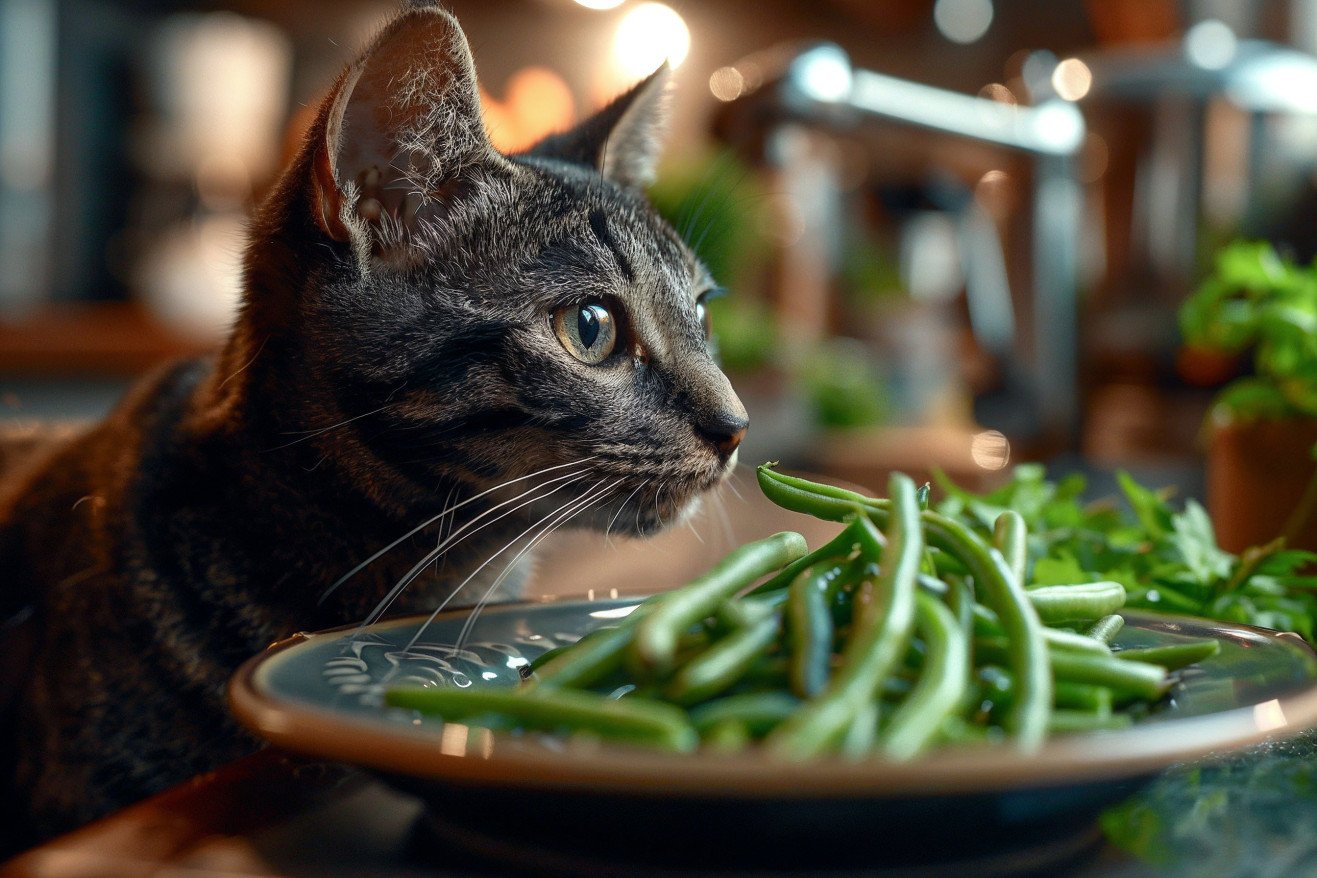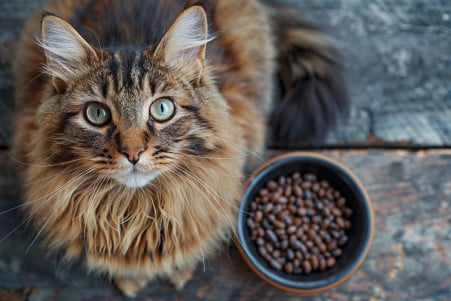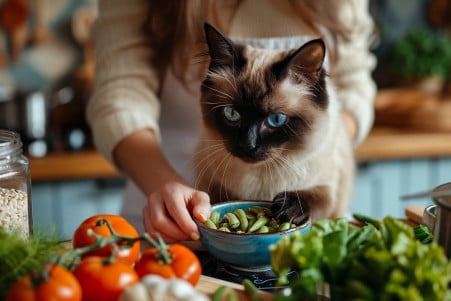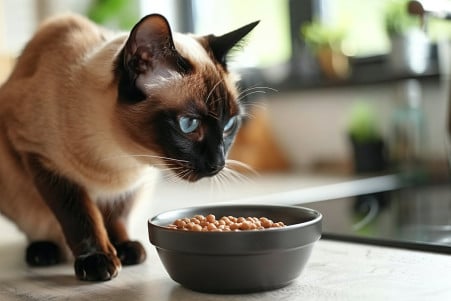Can Cats Eat Beans? A Look at Feline Nutrition
30 March 2024 • Updated 29 March 2024

If you're a cat owner wondering whether it's safe to share some beans with your feline friend, you'll want to know about the potential risks and benefits. Cats can eat small amounts of green beans, but other beans like kidney, pinto, or baked beans should be avoided due to their higher levels of protein and complex carbohydrates that can cause digestive issues for cats. While not toxic, the high fiber content in many beans may upset their stomachs.
In addition to exploring cats' nutritional needs and digestive systems, we'll also discuss findings from veterinary nutritionists and other animal professionals. This in-depth article will help you understand which beans are OK for the occasional cat treat and which ones you should steer clear of. By the end, you'll have a good idea of how beans can be a part of a healthy feline diet, which will help you make sure your pet gets the nutrition they need.
Can cats eat beans?
Cats Are Obligate Carnivores
Cats have very specific nutritional needs that differ from other animals, especially in terms of protein, amino acids, and vitamins. As obligate carnivores, cats have evolved to get most of their nutrients from animal-based sources, which means plant-based sources like beans are not ideal for their diets.
They need more protein than dogs or herbivores, and they also need certain essential amino acids like arginine and taurine, which they can't produce enough of on their own. Arginine is important for metabolism, and taurine is important for vision, heart health, and the health of a female cat's reproductive system.
Cats also need to get essential fatty acids like arachidonic acid from their diet, as well as vitamins like vitamin A and niacin, which they can't make enough of on their own. Feeding a balanced, high-quality cat food that includes animal proteins, fats, and essential nutrients is the easiest and safest way to make sure a cat gets all the nutrients it needs since their bodies aren't well-suited to digesting plant-based sources and getting complete nutrition from them.
What Do Beans Do in a Cat's Diet?
Beans aren't part of a cat's natural diet and aren't necessary for their nutritional needs. The Litter-Robot Blog explains that while beans aren't toxic to cats, they are chock-full of protein, but it's not the kind of protein your cat needs. Cats are obligate carnivores and need certain nutrients that can only be found in animal products.
In addition to being hard to digest, beans are also high in fiber and complex carbohydrates, which can lead to gastrointestinal upset, including vomiting and diarrhea. BetterPet adds that fiber is one of the primary nutritional benefits of beans and that cats don't gain much nutritional value from eating them.
Some beans, such as green beans, chickpeas, and black beans, may be safe for cats to eat in small amounts as an occasional treat. Catster explains that these beans can be safely prepared by soaking and cooking them thoroughly and without any seasonings or other ingredients. However, beans like baked beans, refried beans, and raw beans should be avoided because they're high in salt, contain seasonings, or have compounds that are toxic to cats.
In the end, a cat's diet should be based on high-quality, nutritionally complete commercial cat food. Beans are not a necessary part of a cat's diet and should be fed to cats only occasionally if at all.
Portion Control and Moderation
If you decide to give your cats beans, it's important to exercise portion control and stick to the recommended serving sizes to prevent potential tummy troubles. RexiPets suggests that the recommended serving size for adult cats is 4-5 green beans a day because larger servings can lead to digestive upset. As for other types of beans, such as kidney beans, black beans, or pinto beans, We Love Cats and Kittens says that you should limit the serving size to a tablespoon a couple of times a week.
Beans should always be cooked and served plain with no added spices, sauces, or preservatives that can be toxic to cats. Catster recommends that you rinse canned beans to remove excess salt before giving them to your cat. It's also important to watch your cat closely after you introduce beans into their diet and adjust the serving size or stop giving them beans if you notice any negative side effects.
Potential Health Risks and Complications
Although beans aren't toxic to cats, eating too many or certain types of beans can pose several health risks and complications. Green Matters notes that beans' high fiber content can lead to digestive problems in cats, including vomiting, diarrhea, gas, and abdominal pain, especially if cats eat beans suddenly or in large amounts.
Beans also contain carbohydrates and sugars that cats can't easily digest, which can lead to weight gain, pancreatitis, and even diabetes in some cases. Healthy Paws Pet Insurance cautions that drastic changes in your cat's diet can lead to problems with digestion and malnutrition.
In addition, some beans, like baked beans or canned beans, may be high in sodium or other ingredients that can be harmful to a cat's health if eaten in large amounts. As Catster points out, canned baked beans are often loaded with salt as a preservative and for flavor and cats are not well-equipped to handle excessive amounts of sodium in their diet.
It's important to pay attention to how your cat responds to beans and contact your vet if your cat experiences any symptoms that are ongoing or severe since they could be a sign of an underlying health issue or intolerance.
Conclusion: Adding Beans to Your Cat’s Diet
While cats can eat certain types of beans in small amounts, they are not a necessary or natural part of a cat’s diet. According to the RSPCA Knowledgebase, cats have evolved as obligate carnivores and need the specific nutrients found in animal-based prey. They can’t digest or absorb the nutrients in plant-based foods like beans.
Beans should not be used to replace a cat’s regular, meat-based diet because they don’t contain the essential amino acids, fatty acids, and vitamins that cats need to be healthy. Medivet advises that balanced, high-quality cat food is always better than alternatives because it meets all of a cat’s nutritional requirements.
If you want to add beans to your cat’s diet, it’s important to make sure you’re feeding them in the right amounts, choosing the right types of beans, and watching for any signs of an adverse reaction. You should also talk to a veterinarian or animal nutritionist before making any major changes to your cat’s diet because everyone’s needs and tolerances are different.
By learning about the potential benefits and drawbacks, cat owners can make the best decisions to ensure their pets are getting a well-rounded diet.


